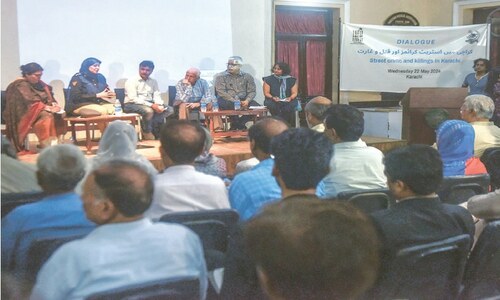KARACHI: Eminent speakers shed light on the role of think tanks in policymaking at a session organised on Thursday afternoon by the Pakistan Institute of International Affairs (PIIA) as the launch partner in Pakistan of The Lauder Institute’s (University of Pennsylvania) Global Go To Think Tank Index.
The event, conducted by PIIA chairperson Dr Masuma Hasan, began with a video message from Dr James McGann, director of the Think Tanks and Civil Societies Programme, University of Pennsylvania. He said since its inception the aim of the programme was to gain a better understanding of the role think tanks played in governments and civil societies. He said this year the theme was ‘Why think tankers matter to policymakers and the public’, involving hundreds of think tanks in 60 countries and over 70 cities. He said the mission of the exercise was to bridge the gap between knowledge and policy.
The first speaker that Dr Hasan invited to express his views on the subject was former senator and federal minister Javed Jabbar. He gave a succinct but comprehensive account of the different types of think tanks. He said they existed in a fixed location premises engaged in research, resulting in regular publications. He said they (should be) preferably independent, nonpartisan and their source of funding should not necessarily determine their output.
A think tank, Mr Jabbar said, was a group of people who convened from time to time, producing a set of recommendations and analyses that subsequently became part of public discourse. Another think tank, which he called close to parliament, was the Senate of Pakistan which formed the Senate Forum for Policy Research where eight former and eight serving senators met periodically. Then, he said, there were advocacy NGOs, such as the Human Rights Commission of Pakistan, who took up issues of public concerns using access to other think tanks highlighting issues by drawing the media’s attention.
Mr Jabbar said the media, especially the print media and specifically the English language print media, had played a valuable role, occasionally publishing reportage on issues that others did not take up. He also lauded the state for creating think tanks. Talking about foreign aid, he termed it the “ultimate insult” when he said he saw a signboard that read ‘USAID Anti-Fraud Hotline’. However, he added there were certain other foreign organisations, for example belonging to Germany, which did not impose their agenda.
Ambassador Sohail Amin said think tanks should be creators of knowledge and should be able to convert ideas into policy options. Every think tank had a set of publications drafted in a manner that could impact others’ viewpoints, he said. He said the new millennium brought with it new challenges, but our policymakers and academics had superficial knowledge of it (for instance, the food crisis of 2010, climate change etc).
Mr Amin pointed out the emergence of the 24/7 media, including the internet, saying it had made the job of think tanks a bit difficult because now there was a flood of information coming through. He said in 2015 he took part in a conference on knowledge-based economy. He said in international relations the best way for the think tanks to work was to come up with recommendations well before an event had taken place. He said currently think tank outputs were not demand-based.
Ambassador Najmuddin Shaikh mentioned a few demand-based institutions set up by former prime minister Zulfikar Ali Bhutto. He also mentioned an institute set up by the armed forces that did some research based on demand. He said research had to be demand-based. He said standards of governance had declined and capacity for field research was limited. He said governance had to improve to draw policies based on solid research.
Former Sindh chief secretary Tasneem Siddiqui said now the focus should shift from foreign policy to the social sector. He said there were departments such as the planning commission which produced documents after research, but the situation with it was that when their next chairman/head arrived he would not have any idea that what happened before him. Then, he said, there were provincial departments of planning and development which had huge funding but were doing no research. He said after the 18th amendment huge funding was being pumped into them. He said in the private sector there was a chamber of commerce, and asked if it had a think tank of its own.
Architect and town planner Arif Hasan concurred with Mr Siddiqui. He said he had been part of quite a few think tanks which enabled him to find out that there was an academics-versus-reality issue. He said the most important subject of research was social change. He said market traditions had changed and we were lost in the 1970s. He said we could have documents but without necessary institutions those ideas could not be implemented.
After the speeches, the floor was opened for the audience to take part in the discussion.
Published in Dawn, January 29th, 2016














































Dear visitor, the comments section is undergoing an overhaul and will return soon.